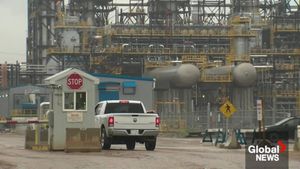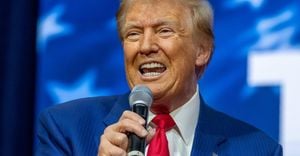Nigeria's economic struggles have put immense pressure on its citizens and the government alike. With rising inflation, unemployment, and widespread hardship, President Bola Tinubu recently made headlines by addressing the media on the role they play during these tumultuous times.
The setting was the All Nigerian Editors Conference held in Yenagoa, Bayelsa State, where President Tinubu, represented by the Minister of Information and National Orientation, Mohammed Idris, emphasized the significance of media integrity. He urged media managers to focus on factual reporting and uphold professional standards amid Nigeria's economic challenges. "You are the custodians of public perception, the gatekeepers of information, and the voice of the people," he said.
The conference, themed "Economic Growth and Development Strategies in a Resource-Rich Country," brought together media owners, editors, and other stakeholders who expressed their concerns about the current state of the media industry. These media figures called on Tinubu to support the industry, which many believe is on the brink of crisis due to the challenging economic climate.
President Tinubu's address highlighted the potential of the media to transform public perception and aid governmental efforts to navigate the country's pressing issues. He implored media professionals to engage truthfully and constructively, fostering public comprehension of government initiatives aimed at economic revitalization. "My administration is committed to turning our challenges to opportunities by ensuring our vast resources bring prosperity to all Nigerians," he stated.
Among the key points of Tinubu's speech was the assertion of Nigeria's abundant resources. He pointed out both human and natural wealth as pivotal to the nation's ambition of becoming one of the world's prosperous nations. "With the united effort from government, citizens, and the media, we can build a resilient, diversified economy," he added. His vision underlines not just recovery but growth, emphasizing the role of various sectors, including media, to contribute effectively to national development.
While addressing the editorial community, there was also emphasis on the need for honesty, particularly as misinformation and sensationalism can dilute genuine efforts at economic reform. He expressed his belief this is what Nigerians expect from him as their elected leader and outlined his commitment to addressing economic woes decisively.
The situation is serious. With inflation soaring and the cost of living increasing, many are feeling the crunch. Everyday households are grappling with the financial strain, leading to widespread discontent. The President's message at the conference appears not only aimed at galvanizing media forces but also serves as a reminder of the societal roles they play, especially during crises.
Prominent figures within the conference echoed these sentiments. Media owners and editors urged Tinubu to facilitate measures to protect the industry, citing the necessity of journalism to socio-economic development. They expressed concerns about the survival of the media sector amid rising operational costs and dwindling revenue streams.
Feedback from the media was timely, as they play a central role not just in reporting on issues but also shaping public opinion and influencing government policy. By encouraging accurate and responsible journalism, the Tinubu administration hopes to establish clearer communication lines with the public, thereby fostering trust and collaboration.
Reflecting on Nigeria's potential, he indicated the need for strategic investments, hinting at partnerships between the government and private sectors. The aspiration is to leverage available resources to spur growth and create job opportunities.
Past concerns about Nigeria's legislative framework for investing, especially within the media and technology sectors, were also highlighted. Stakeholders at the conference advocated for reforms aimed at modernizing the media sector to adapt to contemporary challenges, stressing the importance of adapting to the digital age where false narratives can spread rapidly.
It is evident the media will play an integral role moving forward. By fostering accountability and facilitating dialogue about national priorities and solutions, they can help unite the efforts of various stakeholders working toward economic prosperity.
Tom Ndukwe, who was present at the conference, noted, "A well-informed populace is the bedrock of democracy and development. The media has the responsibility to keep citizens informed and to challenge narratives when necessary." He advocates for training programs aimed at enhancing journalistic skills to meet the demands of today's fast-paced media environment.
The stakes are high. With the government under unyielding scrutiny from the public, the collaboration between the media and government is more important than ever. It is hoped this renewed call for integrity and constructive reporting will yield positive changes, not only for journalists but for Nigeria as a whole.
While specific policies to tackle the media's concerns are yet to be discussed, there is optimism among attendees. This appears to be the beginning of broader discussions to adapt to Nigeria’s challenging economic climate, ensuring all sectors, including the media, can thrive.
The conference served as both a platform for reflection and opportunity creation as Nigeria navigates through these turbulent economic waters. President Tinubu's remarks, paired with the media's response, mark just the start of what may be needed for the revival of Nigeria’s economy.



